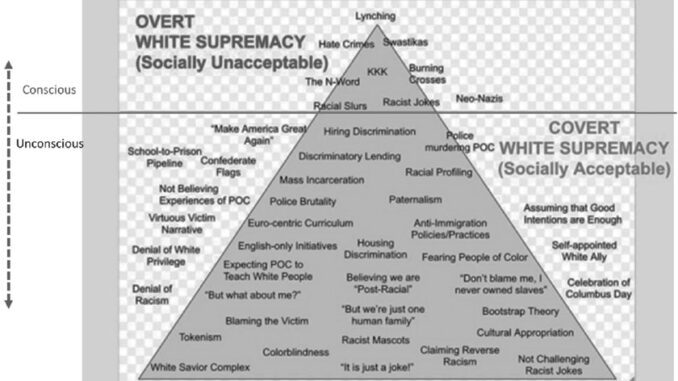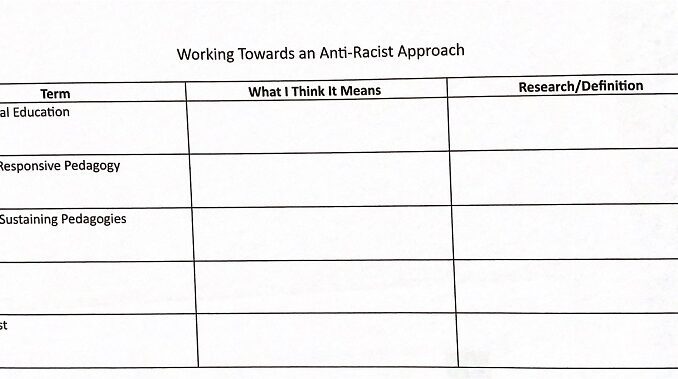
RALEIGH — Audio and video obtained by North State Journal show Critical Race Theory-themed professional development training conducted by the district’s Office of Equity Affairs (OEA) staff despite one district official’s denials such training existed.
As reported by North State Journal, outgoing assistant superintendent of the OEA Rodney Trice had told Wake County School Board members that Critical Race Theory was not part of the district’s offerings.
Critical Race Theory (CRT) is based in the belief that all facets of society, all people, and history are inherently racist and that resolution or redemption for those people or societal structures is not possible. CRT is based on Marxist Critical Theory, the premise of which divides all aspects of society into two groups, oppressed and oppressors. CRT adapts Critical Theory using a racial lens, with whites as perpetual oppressors and blacks as the oppressed.
The training videos obtained features OEA staff members Christina Spears and Teresa Bunner. Bunner’s title is “Director of Equity Affairs” and Spears is the special assistant to Rodney Trice, the assistant superintendent in charge of the OEA.
The training materials obtained by North State Journal revealed multiple “antibias” training sessions conducted at a Wake County school earlier this year.
The training, which spanned three non-consecutive sessions, was titled, “Working Towards an Anti-Racist Approach.”

A closer look at the materials and discussions showed a hyper-focus on race and culture. Core topics included “social justice,” “culturally responsive” and “antiracist” curriculum.
During one session, Bunner told participants the training would help them to “move towards an antiracist instructional approach.”
Bunner also said they would “talk about things like social justice curriculum or culturally responsive curriculum or antiracist curriculum,” and that “curriculum is very much in many ways a static thing. It is the materials that we use.”
Spears described the use of a “Compass” for staying “morally, emotionally, intellectually, relationally engaged” in the conversation and the use of “four agreements.”
Spears went on to describe the “four agreements,” which participants were asked to make which included, “staying engaged,” “experiencing discomfort,” Speak your truth,” and to “expect and accept nonclosure.”
A summary of the four agreements
- Stay engaged: “remaining morally, emotionally, intellectually, and socially involved in the dialogue.”
- Experience discomfort: discomfort is inevitable, especially when talking about race. Not talking about race creates divisiveness, which already exists in society and in schools. Only through uncomfortable conversations can “healing and change” begin.
- Speak your truth: Don’t say what you think people want to hear. Be open and truthful about thoughts, feelings and experiences.
- Expect and accept nonclosure: there is no quick solution to racial understanding.
The four agreements come from “Courage Conversations about Race: A field guide for achieving interracial equity in school.”
Courageous Conversations is a set of “antiracist” and “antibias” training materials produced by Glenn Singleton and his organization, Pacific Education Group.
Courageous Conversations also includes “six conditions.” These conditions tell participants to focus on “the personal, local and immediate,” to “isolate race,” and to “normalize social construction.” Also, participants should “monitor” the agreements and conditions to establish parameters, use a “working definition” for race, and finally, examine the presence and role of “Whiteness.”
Singleton’s training has also been used by Wake County Public Schools’ Office of Equity Affairs (OEA) dating back to 2015. Records obtained from Wake County Public Schools include a vendor history from July 1, 2015, to June 10, 2019, which shows total payments of $261,790 to PEG.
At least one version of similar training in Wake County involving Singleton’s work included an “overt white supremacy” pyramid chart, as seen below.

As previously reported by North State Journal, Wake County Public Schools had offered a professional training course title “Intro to Critical Race Theory.” That course was to be conducted by The Equity Collaborative, a training organization founded by a sitting member of the General Assembly, Rep. Graig Meyer (D- Durham). About a day after North State Journal filed records request for more information, the district removed the course.
Additional reporting by North State Journal debunked denials that Wake County had Critical Race Theory offerings made by Trice. On May 6, it was announced Trice would be departing Wake County Schools to return to the Chapel Hill Carrboro City Schools district’s equity department.
Trice was hired into the OEA position at WCPSS seven years ago with a starting salary of $125,000. As of May 7, 2021, WCPSS said his current salary stands at $141,767. Chapel Hill Carrboro Schools will be paying Trice $161,94 for the role of “Chief Equity and Engagement Officer.”

